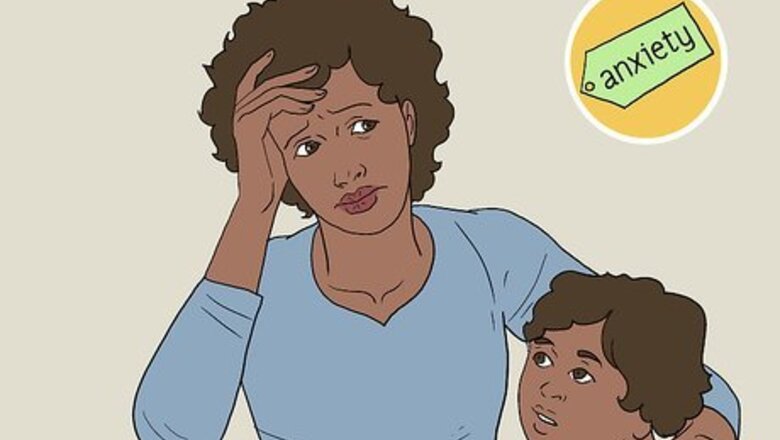
views
Coping with Anxiety in the Moment
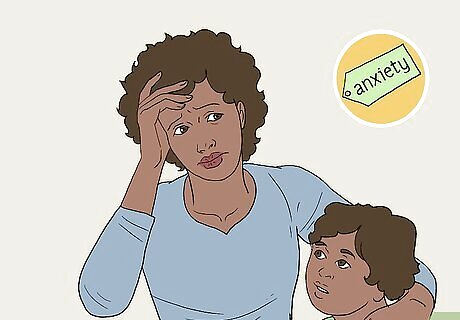
Learn to label anxious thoughts as they occur. It can be hard enough to stop feeling anxious, but it’s even harder if you can’t recognize when it’s happening. If you find yourself ruminating on scenarios where bad things happen, try to touch base with a word or phrase that reminds you that you’re experiencing anxiety. This on its own might not stop the anxious feeling, but it can be an empowering step toward regaining control of your mental state. For instance, you might tell yourself, “This is anxiety,” or “I’m worrying about something I can’t control right now.”

Focus on your breathing to calm yourself down. Anxiety often comes along with physical reactions like an increased heart rate and rapid breathing. To help get control of your body, take several slow, deep breaths. As you do that, pay attention to how your chest feels as it rises and falls, and listen to the sound of your breath. This can help you feel more centered. When your body is reacting to anxiety, it can be even harder to stop negative thoughts, even after you acknowledge that you’re having them. That's why it's important to calm yourself physically first. If your mind starts to wander as you’re doing this, try to focus on your breathing again until you start to feel a little calmer.
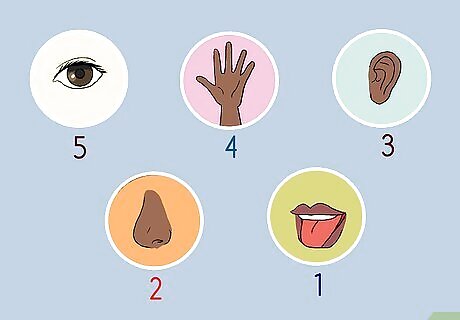
Engage each of your 5 senses to disrupt anxious thinking. If you’re struggling with intrusive anxious thoughts, try to find things around you that you can see, hear, feel, taste, and smell. By deliberately focusing your thoughts on your physical environment, you can help break the cycle of negative thoughts, grounding you in the present moment. Try the 5-4-3-2-1 Coping Technique: Identify 5 things you can see, 4 things you can touch, 3 things you can hear, 2 things you can smell, and 1 thing you can taste.
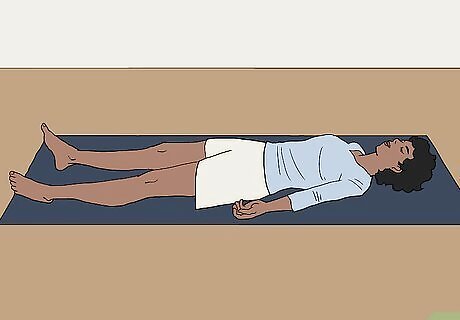
Try progressive muscle relaxation to help yourself release tension. Progressive muscle relaxation involves tensing and then relaxing individual muscle groups throughout your body to help you feel relaxed. Start by taking a deep breath as you clench each set of muscles. Hold that for about 4-10 seconds, then breathe out and relax your muscles for 10-20 seconds. Start with your hands, then move into your forearms, biceps, upper arms, and shoulders. From there, move to your forehead, then tense the muscles moving down your face and neck, then your chest, back, stomach, buttocks, thighs, and legs. You can also focus only on the muscles that feel the tensest while you’re anxious.

Shift your focus to something you can control. Sometimes, anxiety can leave you feeling paralyzed. Once you start to regain control of your thoughts, try to busy yourself in a project that engages your body and mind. Don’t pressure yourself to tackle everything at once—just find something that you can do for a few minutes while your anxiety subsides. For instance, if your home is a mess, don’t worry about cleaning the whole thing. However, you might fold a load of laundry or put away the dishes. In addition to helping distract you, you’ll feel more in control of your environment. Exercise, like going for a 30-minute jog or doing a cardio routine, can be another great way to burn off some of your negative energy. In addition, exercise releases feel-good chemicals in your brain, and it can leave you feeling strong and empowered. Whatever you choose doesn’t necessarily have to be productive—you could do something you find relaxing, like putting together a jigsaw puzzle or coloring in an adult coloring book. Tip: For an extra mood boost, try heading outside. Being in nature can help you feel relaxed and release stress.
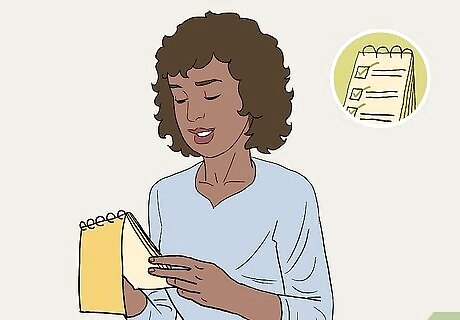
Address anything that might be a realistic concern. Some anxiety is actually healthy—it's a motivating emotion that reminds you if something needs to be taken care of, and it's a natural instinct when you're a mom. If you find yourself worrying about something that you actually can control, make a list of the steps you need to take to resolve that problem, then follow through with doing it. For instance, if you’re worried the TV or dresser will fall on your small child, install anchors that secure the item to the wall. If you’re anxious about what your teenager might be doing online, make a rule that their device has to stay with you at night, enable parental controls on any computers, gaming systems, and household devices, and set up software to monitor their online activity.
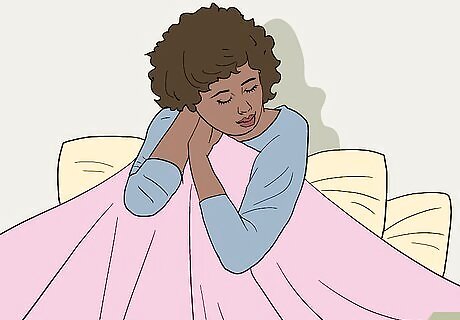
Find something that physically comforts you. Sometimes, something as simple as a great hug, a cozy sweater, or a warm bath can help you feel immensely better. If you can, find something that makes your body feel comforted, and reach for that when you start to feel overwhelmed by anxiety. If you’re anxious often, you might find a weighted blanket soothing. You can find these online and at some department stores.
Making Lifestyle Changes to Manage Anxiety

Make time for the things you love. It can be really hard to take time for yourself when you’re a mom. It can be even harder if you’re struggling with anxiety that constantly reminds you of all the things that need to be done. However, in order to be a healthy, happy role model for your children, it’s essential that you maintain a strong sense of your own identity. Think about the things that really make you happy, and make space for that in your life. For instance, every so often you might put the kids to bed early, then paint your nails, listen to your favorite playlist, or watch a guilty-pleasure show. If your idea of self-care is pursuing your dream career, sign up for an online class that will help you reach your goal.

Lean on your support system for emotional support. When you're struggling with anxiety, especially if it's combined with depression, you may start to isolate yourself from your loved ones. If you see yourself doing this, try reaching out to them, instead. Let them know that you struggle with anxiety but you’re trying to manage it, and part of that means that asking your loved ones for a little extra reassurance sometimes. For instance, you might tell your partner, “I know I seem worried and stressed out all the time, and that can’t be fun for you. I’ve really been having a hard time with that lately, but I’m trying to find healthier ways to deal with it. Thanks for being here for me—hopefully things will feel a little better soon.” If you feel that the people around you aren’t supportive and you don't have anyone to talk to, try joining a support group for moms, or consider talking to a counselor.

Try practicing daily meditation or prayer to help fight long-term anxiety. Spending a few minutes a day in a quiet, reflective state can help you feel more grounded, and both meditation and prayer can help you feel more at peace and less anxious overall. Choose the approach that fits your lifestyle and beliefs best, and make time for it each day, even if it’s only 5-10 minutes. If you want to practice meditation, sit in a quiet place and try to clear your mind of any thoughts at all. If your thoughts wander, imagine yourself releasing them and let your mind go blank again.

Make a gratitude journal to help yourself remember what you’re thankful for. If you regularly, intentionally practice gratitude, it can help you feel less anxious in the long run. Every day, write down something that you’re grateful for. Try to be as specific as possible—instead of writing that you’re grateful for food, for instance, you might write, “I’m grateful for the blueberry muffins at that bakery downtown.” When you start to feel anxious, take out the journal and read through it to remind yourself of the good things in your life.

Get 7-9 hours of sleep a night whenever you can. It can be really hard to get a full night's sleep, especially if you have a new baby, but negative, intrusive thoughts just seem to take hold easier when you're tired. Try to establish a steady sleep schedule by going to bed at the same time each night and waking up at the same time each day. In addition, stick to the same bedtime routine every night to help your body know it's time to wind down. Try avoiding your phone, tablet, or anything that emits blue light for at least 1 hour before bedtime, which may make it easier to fall asleep.
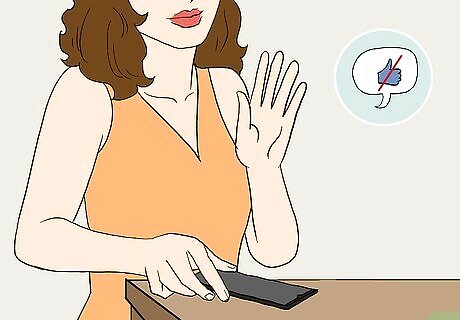
Limit your time on social media to feel more content. Social media can be useful and can even help you find a supportive community. Unfortunately, sometimes on social media, you can end up feeding the same feelings you're trying to escape. Try to limit yourself to checking it once a day, or give yourself set times when you can go through your notifications, and put your phone down the rest of the time. It can be hard to avoid comparing yourself to others online, or you might even compare your children to other people’s kids, and that can make you feel more anxious. Remind yourself that social media never tells the whole story, and try to focus on the good things in your life instead.

Avoid turning to alcohol or drugs for stress relief. It’s always important to find healthy coping mechanisms for anxiety, but it’s especially important to avoid turning to substance abuse when you’re a mother. It’s okay to have a drink now and then if you’re of legal drinking age and you can do so in moderation, but limit yourself to no more than one drink a day, and do not use any kind of illegal drugs. Drug and alcohol abuse can make it hard for you to care for your children, and it may make it harder for them to have healthy relationships or perform well in school.

Talk to your doctor or a therapist if your anxiety interferes with your life. If your anxiety keeps you from sleeping, preoccupies you throughout the day, or is affecting your relationships, you should talk to your doctor about your symptoms. They can help you work out a personalized treatment plan, which may include therapy or even medication to help control your anxiety. If you’ve recently had a baby, your doctor may determine that your anxiety is postpartum anxiety, or PPA. This is similar to postpartum depression, or PPD, and the two may go hand-in-hand.














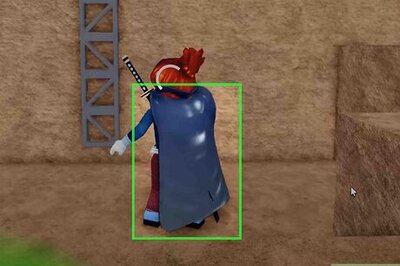



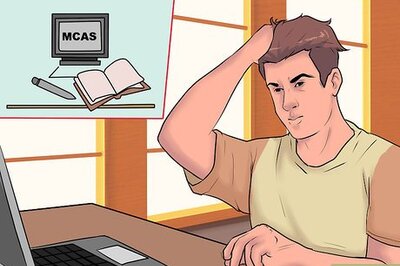
Comments
0 comment